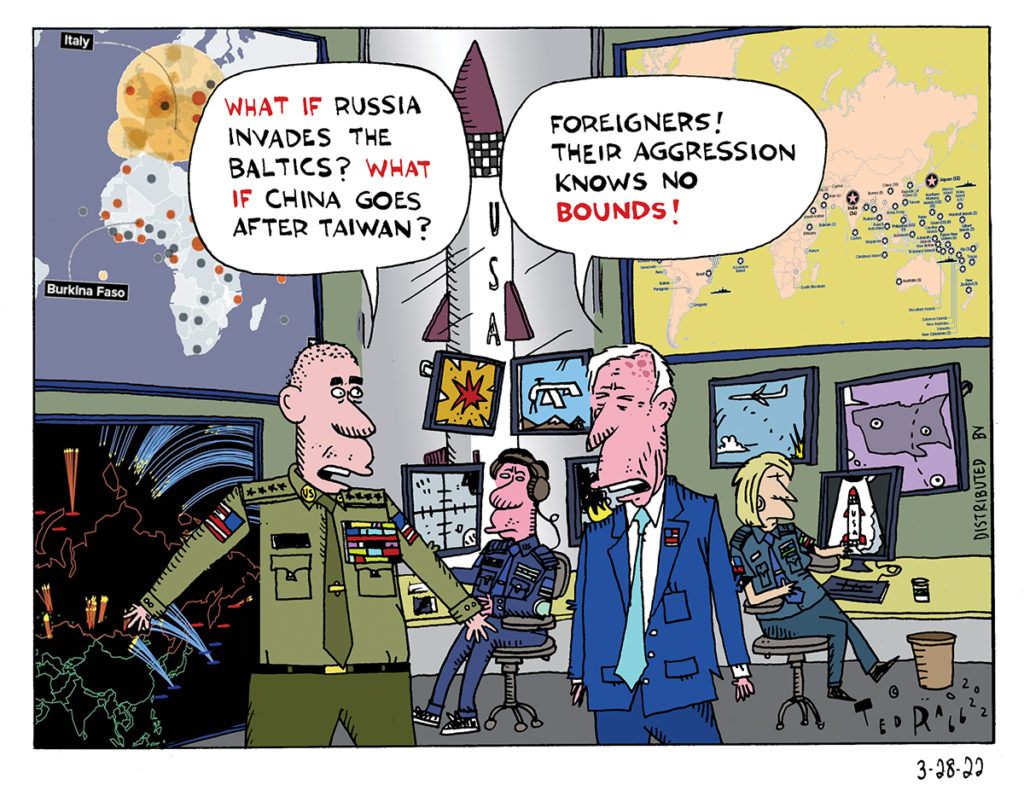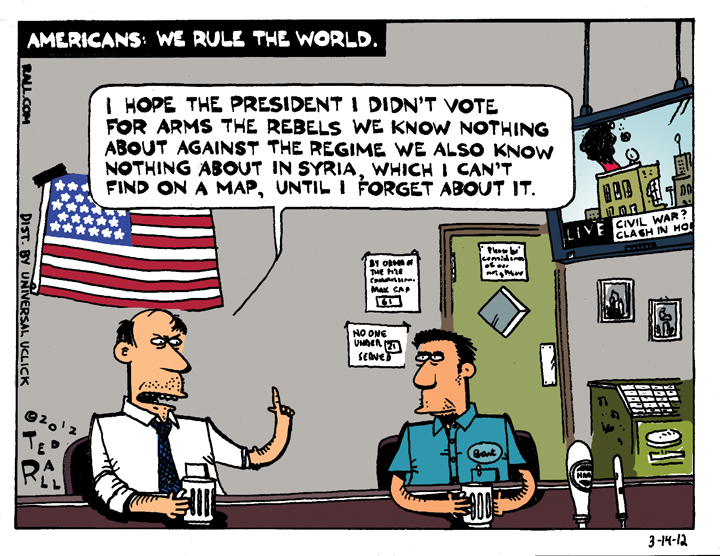Russia’s invasion of Ukraine has prompted American political leaders and media outlets to constantly speculate about other countries’ military aggression, whether it be the possibility that China would invade Taiwan or that Russia would next turn to the Baltic states. Rarely do they ever consider the fact that they themselves live in the most militarily aggressive country in the world, and that the world should be more afraid of us than we should be afraid of them.
Trump Tries to End the Afghanistan War, Democrats Want to Keep Killing

Pollsters have observed a consistent enthusiasm gap between supporters of President Trump and former Vice President Joe Biden. Any factor that dampens Democratic turnout could contribute to a second come-from-behind victory for the GOP.
Adding to liberal voters’ ambivalence over Biden is a rarely-discussed aspect of Trump’s presidency. Trump’s skepticism of foreign military entanglements places him to the left of mainstream Democrats like Biden. His foreign policy aligns more closely to those of the progressives who are licking their wounds from the primary defeat of Bernie Sanders—and who are considering whether or not to vote at all.
In 2016 Trump upended traditional right-wing politics by campaigning against the Iraq War—during the Republican primaries, where candidates usually compete to look tough. This year the surprise dove can take credit for extricating the U.S. from its longest war, the 18-year-old meatgrinder of Afghanistan. Not only was Trump the first post-9/11 president to hold direct talks with the Taliban, he concluded a peace deal with the insurgency that leads to a total American withdrawal by April 2021 if the Taliban uphold their commitments. Now he is even considering an accelerated timetable that would bring back the last American soldier before Election Day.
Enter the war pigs.
Trump’s peace initiative is under attack by an odd coalition of neoconservative Republicans including Rep. Liz Cheney of Wyoming and a group of Democratic hawks who inserted an amendment to the latest National Defense Authorization Act. The add-on denies the president funding to bring back the last 8,000 troops. In order to get the money the Defense Department would have to certify that pulling out would not increase the chances of Afghanistan ever becoming a safe haven for terrorists in the future. How could they promise that?
“There were elements of the progressive left and the pro-Trump right who supported these withdrawals,” Glenn Greenwald noted in The Intercept, but they lost the House fight.
Trump is no one’s idea of a pacifist. He expanded the drone assassination program he inherited from Obama and reduced its already low transparency. He supports Saudi Arabia’s vicious proxy war in Yemen. He has engaged in old-fashioned gunboat diplomacy against China.
Even so, many progressives find more to like in Trump’s willingness to engage with the leaders of countries like North Korea and Iran. Prior to Trump, high-level negotiations were positioned by the U.S. as rewards for improved behavior; Trump talks without preconditions. Progressives prefer diplomacy to war.
Biden, on the other hand, voted to bomb Serbia, invade Afghanistan and Iraq. He has never apologized—so it’s reasonable to assume he’d commit the same crimes again. He sat at Obama’s side as that administration armed and funded radical jihadis in Libya and Syria, expanding regional conflicts into all-out civil wars, one of which created the vacuum filled by ISIS. American leftists support Nicolás Maduro, a socialist, in Venezuela; Biden backs Juan Guaidó, who failed to seize power in a military coup last year. These are Hillary Clinton’s politics, an approach left-leaning voters despise.
“The liberal establishment is desperate to return a centrist to the White House in November and reestablish the country’s more stable military dominance of the world order, disrupted only briefly by Donald Trump. Joe Biden’s terrible track record on foreign policy — including his championing of war in Iraq — suggests a return to Obama-style strong military interventions abroad,” David Davison and Alex Thurston wrote recently in Jacobin.
“Biden represents the return of the classical foreign policy establishment,” Alan Minsky, executive director of Progressive Democrats of America, told The Progressive magazine. “Biden is running a campaign as a restoration candidate.”
And while Biden has made overtures to the progressive wing of his own party on such domestic issues as healthcare and the environment, he has expressed no willingness to compromise on foreign policy.
Last week a coalition of progressive groups wrote to Biden to demand that he appoint anti-interventionists to his cabinet and as top officials in the State Department. “Without national security and foreign policy personnel who are willing to learn from the mistakes of the past and understand the need for change this moment presents, we fear our country—and the world—risk descending into climate and economic chaos fueled by further corruption and authoritarianism. We expect a potential Biden administration to reflect the urgency of this moment in its personnel appointments,” the letter read.
I would not hold my breath.
(Ted Rall (Twitter: @tedrall), the political cartoonist, columnist and graphic novelist, is the author of the biography “Political Suicide: The Fight for the Soul of the Democratic Party.” You can support Ted’s hard-hitting political cartoons and columns and see his work first by sponsoring his work on Patreon.)
SYNDICATED COLUMN: Iran – Because Two Wars Aren’t Enough
Why Doesn’t Anyone Call Out Romney for Warmongering?
Mitt Romney had a barnburner of a weekend in Israel. The GOP nominee apparent shared his unique combination of economic and anthropological wisdom, attributing the fact that Israel’s GDP and average income is many times higher than those of the Palestinian Occupied Territories to Israelis’ superior “culture.”
As if spewing one of the most overtly racist lines in recent presidential campaign history wasn’t enough, eschewing “containment” (read: “diplomacy”), Romney also endorsed a preemptive Israeli military strike against Iran in order to prevent the latter’s nuclear program—Israel’s own, illegal nuclear weapons stockpile is OK since it’s a U.S. ally—from moving forward.
“We have a solemn duty and a moral imperative to deny Iran’s leaders the means to follow through on their malevolent intentions,” Romney said, stating that “no option should be excluded.”
He didn’t say how he knew the intentions of Iran’s leaders. Clairvoyance? Bush had it too.
Though Mitt slightly walked back his campaign’s sabre rattling, the message was clear. If he is elected, Israel will receive a blank check to begin a war against Iran, one of the most well-equipped military powers in the Middle East—a conflagration in which the United States could easily wind up getting dragged into. (In a subsequent interview he reiterated that “we have all options on the table. Those include military options.”)
Most criticism focused on Romney’s flouting of the traditional proscription against candidates questioning a sitting president’s foreign policy while visiting foreign soil. Though, to be fair, the differences between his and President Obama’s approach to Israel and Iran are tonal and minor.
As usual with the U.S. media, what is remarkable is what is going unsaid. Here we are, with the economy in shambles and the public worried sick about it, the electorate tired of 12 years of war against Afghanistan and nine against Iraq, yet Romney—who could be president six months from now—is out ramping up tensions and increasing the odds of a brand-new, bigger-than-ever military misadventure.
Warmongering has gone mainstream. It’s a given.
In a way, Romney’s willingness to risk war against Iran is merely another example, like the car garage and dressage, of how clueless and out of touch he is. Most Americans oppose war with Iran. For that matter, so do the citizens of the country on whose behalf we’d be killing and dying, Israel. But even Romney’s Democratic opponents give him a pass for Romney’s tough-guy act on Iran.
The reason for the somnolent non-response is obvious: it’s nothing new. Year after year, on one foreign crisis after another, American presidents repeatedly state some variation on the theme that war is always an option, that the military option is always on the table. You’ve heard that line so often that you take it for granted.
But did you know that “keeping the military option on the table” is a serious violation of international law?
The United States is an original signatory of the United Nations Charter, which has the full force of U.S. law since it was ratified by the Senate in 1945. Article 51 allows military force only in self-defense, in response to an “armed attack.” As Yale law and political science professor Bruce Ackerman wrote in The Los Angeles Times in March, international law generally allows preemptive strikes only in the case of “imminent threat.” In 1842 Secretary of State Daniel Webster wrote what remains the standard definition of “imminent,” which is that the threat must be “instant, overwhelming, leaving no choice of means and no moment for deliberation.” The enemy’s troops have massed on your border. They have superior force. What must be done to stop them is evident. There’s no time for diplomacy.
Iran’s nuclear program doesn’t come close to this definition, even from Israel’s standpoint. Bruce Fein, deputy attorney general under Reagan, told Fairness and Accuracy in Reporting’s Extra! Magazine: “It is nothing short of bizarre to claim, as the Obama Administration is doing, that the mere capability to make a bomb is justification for a preemptive attack. That’s a recipe for perpetual war. Almost any country could have the capability to make a bomb. They are torturing the word ‘imminent’ to the point that it has no meaning.”
By endorsing an Israeli attack against Iran at a time when there is no proof that Iran has nuclear weapons, intends to develop them, or use them if it does, Romney is going farther than Obama, who has engaged in back-channel diplomacy.
The Allies’ main brief against the Nazi leaders tried at Nuremberg was not genocide, but that they had violated international law by waging aggressive war. Yet every American president has deployed troops in aggressive military actions.
Aggressive war hasn’t been good for America’s international image, the environment, our economy or the millions who have died, mostly for causes that are now forgotten or regretted. But unless we draw the line against reckless, irresponsible rhetoric like Romney’s, it will go on forever.
(Ted Rall’s new book is “The Book of Obama: How We Went From Hope and Change to the Age of Revolt.” His website is tedrall.com. This column originally appeared at NBCNews.com)
(C) 2012 TED RALL, ALL RIGHTS RESERVED.



